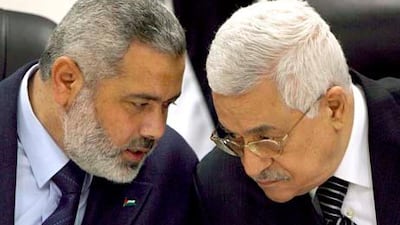Palestinian President Mahmoud Abbas and his rival in the Hamas faction that rules Gaza, Ismail Haniyeh, had a rare phone call on Tuesday.
The Hamas leader called the leader of the Palestinian Authority, which operates limited self-rule in the occupied West Bank, to express his condolences about the death of a senior Fatah official, the official Palestinian news agency reported.
Ahmed Abdel Rahman, 76, died on Monday.
Mr Abbas and Mr Haniyeh have been locked in a bitter dispute since Hamas routed the group from the Gaza Strip in 2007.
Several bids for unity have failed and relations have continued to deteriorate.
In 2018, then Palestinian Authority Prime Minister Rami Hamdallah was the target of a bomb attack on a rare visit to the strip. The authority blamed Hamas for the attack, which it denied.
But last week, Hamas agreed to a proposal by Mr Abbas for elections next year after a visit to the strip by the Palestinian Central Elections Commission.
It was the body’s third visit in the past month. Mr Haniyeh reportedly agreed to the elections on the third and final visit.
“We will move forward in our national dialogue on the elections of the Palestinian National Council while reconsidering ways to rehabilitate and develop the institutions of the Palestine Liberation Organisation to resume its active role,” Mr Haniyeh said.
Mr Abbas had announced the intention to hold a new election at the UN General Assembly in September.
There has not been a Palestinian election since 2006, a major criticism of both parties by the West. Now, there could be an election as soon as February.
The terms of the poll still need to be outlined but the rival factions have agreed to it in principle.
Mr Abbas reportedly wants the election to include occupied East Jerusalem, which would require the consent of Israel.
Gaza and the occupied West Bank are also split by Israeli territory and now operate as separate entities.
It was also reported this week that Egypt was to allow Mr Haniyeh to leave the enclave to hold talks with officials in Cairo, then Russian officials about developments regarding a truce with Fatah.
The phone call between the pair also comes amid a background of heightened tension between Israel and Gaza’s second biggest group, Islamic Jihad.
On November 12, Israel assassinated a senior Islamic Jihad leader in the Gaza Strip, sparking a two-day flare-up that killed 36 Palestinians. No Israelis died.
Islamic Jihad fired about 450 rockets at Israel, many of which were intercepted by the Iron Dome defence system.
Hamas has controlled Gaza since 2007 and until this month's escalation, Israel had held the movement responsible for all rocket fire coming from the territory.
Hamas has fought three wars with Israel since 2008.
Israel maintains a crippling economic siege on the coastal enclave, but Hamas also blames the Palestinian Authority for making conditions worse through salary cuts to employees in the territory.
Gazans have gathered at the border between Israel and the territory on an almost weekly basis since March 2018.
But for the third straight week, Hamas cancelled the regular Friday protests last week for fear of instability.
Earlier on Friday, an Islamic Jihad militant died of wounds he sustained during fighting.

